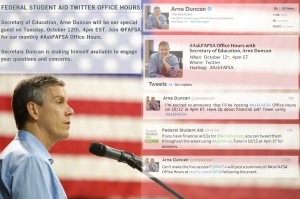On October 12th at 4pm ET, Secretary of Education, Arne Duncan will join @FAFSA to answer your financial aid questions during the October edition of #AskFAFSA Office Hours. Maybe you have a question about completing the FAFSA or understanding your loan repayment options? Maybe you want to know more about the new resources we just launched? If you have a financial aid question for Secretary Duncan, now’s your chance to ask!
- Have questions for @ArneDuncan You can start submitting your questions on Twitter and Facebook today. Be sure to include the #AskFAFSA hashtag in your tweets. We will be monitoring for questions on Facebook and Twitter from now through Friday.
- On Friday, October 12th, at 4pm ET, follow @FAFSA or the #AskFAFSA hashtag on Twitter to join the conversation. Arne will be answering your questions live. Don’t use Twitter? You can also follow along using the Twitter app on our Facebook page.
- Can’t make the live session? A summary of #AskFAFSA Office Hours, including the full Q&A, will be posted on Storify following the event.







Dear Mr. Arne Duncan
I am writing you because my son of 11 year’s old is being bullied and harassment by school system because my wife & I have a lawsuit against school because of a black box they were using for on campus suspension for a fifth grage we as parents call that child abuse i believe they are retaliteing against us by harassment our child could you help us in this matter please.
thank you & God bless you
Mr.&Mrs. Barnett
Why is it that private lending firms charging as much as 8.5% APR have been allowed to be representatives of the US Government when we were under the impression that Students Loans are to be capped off at low interest rates beneath 4%?
The low interest rates you’re hearing about only apply to Direct Subsidized Loans to undergraduates. Private lenders can offer interest rates on non-federal student loans that are higher.
Cameron Brenchley
Office of Communications and Outreach
I am appalled at the discriminatory practice that has been implemented by FAFSA! If a student has a documented disability and cannot pass certain tests imposed by states in order to graduate with a regular high school diploma they have to accept the alternative, a modified diploma! A modified diploma is not recognized as a equivalent diploma (although these student have met the credit acquisition requirements) and cannot receive Federal Financial Aid. I am speaking about the Invisible disabilities, Specific Learning Disabilities, to be more precise. These hard working, committed students are being punished for having disabilities. It’s truly leaving children behind!!
Thanks for the comment Cindy. Since 2008, students with intellectual disabilities who are enrolled in Departmentally approved Comprehensive Transition & Postsecondary Programs are eligible for federal financial aid (but no federal student loans) without needing to have a high school diploma. You can learn more here: http://studentaid.ed.gov/eligibility/intellectual-disabilities. And, if a school in your area is not listed, you can ask them to apply for approval.
Cameron Brenchley
Office of Communications and Outreach
Why aren’t parents offered income based repayment?
What are people supposed to do when they don’t have Internet access at home and live in a rural area? More programs are requiring Internet access such as the IRS Data Retrieval Tool information for postsecondary schools.
Am I eligible for financial aid if I’m undocumented? I am applying for US citizenry.
In order to be eligible for federal student aid, you must be a citizen or eligible noncitizen. The most common category of eligible noncitizen is that of permanent resident (someone with a “green card”), but there are other categories as well. Find out if you qualify: http://1.usa.gov/MyMKIP
Cameron Brenchley
Office of Communications and Outreach
Why should he be able to candy pick the questions he wants to answer? Sounds like a staged event to promote a failing agency. Why doesn’t he have a town hall meeting and ask real Americans for questions, and look the American public in the eye with a answer??
Arnie… I have questions your department is skirting..come ask me
I can’t claim my daughter as a dependent but FAFSA says she is. I make 8.00 an hour after being laid off from my School Board Job. This needs to be fixed!!
Whether a student is dependent or independent is set by Congress and is different than whether a parent can claim a student as a dependent on their taxes. Generally, a student is dependent unless they are 24 or older, or a graduate student.
Cameron Brenchley
Office of Communications and Outreach
Can I use left over funds from an Americorps stipend to repay a student loan ?
Yes! You can use your Segal AmeriCorps Education Award for nearly all federal education loans, but not for private student loans. More info: http://1.usa.gov/RjEMtL
Cameron Brenchley
Office of Communications and Outreach